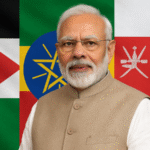Some controversies are accidents. Others are manufactured. And then there are some like the one over the recent Taliban presser in New Delhi that are pure theatre, scripted outrage by the usual suspects in Lutyens’ Delhi.
When Afghanistan’s Foreign Minister Amir Khan Muttaqi addressed a limited press gathering at the Afghan Embassy in New Delhi, several women journalists were denied entry. The reason was depressingly predictable; the decision was taken by Taliban officials accompanying Muttaqi.
Within hours, the Congress party’s outrage machinery kicked into gear. Priyanka Gandhi Vadra and Rahul Gandhi launched into a performative moral crusade against the Modi government, demanding accountability, invoking “Nari Shakti,” and accusing the PM of hypocrisy on women’s rights. And the overly slavish ecosystem — from dubious fact-checkers like Zubair to propagandists masquerading as ‘neutral journalists’ — promptly toed the line, targeting the BJP over what they claimed was the saffron party’s hypocrisy on gender equality.
As always with the Gandhis and the Congress ecosystem, it made for good social media kerfuffle — but terrible reasoning.
The MEA’s clarification
The Ministry of External Affairs (MEA) immediately clarified that India had no role to play in the press conference addressed by Amir Khan Muttaqi. The event, it explained, was organized by Afghanistan’s Consul General in Mumbai, held within the premises of the Afghan Embassy, and coordinated entirely by the visiting Taliban delegation. The Afghan Embassy, the MEA pointed out, “does not come under the jurisdiction of the Indian government.”
India’s only involvement, if any, was to suggest that women journalists be included among the invitees, a recommendation the Taliban predictably ignored.
In other words, India did not ban women; the Taliban did. But in the Congress playbook, facts rarely matter when outrage can fetch headlines.
The Vienna Convention: What the law actually says
To understand why India could not, and should not have intervened, one must look to the Vienna Convention on Diplomatic Relations (1961), the backbone of modern diplomacy. Ratified by over 190 countries, including India, the Convention sets the rules for how embassies operate and what rights and responsibilities they and their host countries have.
Contrary to a common misconception, an embassy is not the sovereign territory of the foreign country it represents. It remains part of the host nation’s soil. However, under Article 22 of the Convention, the premises of a diplomatic mission are declared “inviolable.” This means that the host country’s authorities cannot enter or enforce their laws within the embassy without the permission of the head of that mission. While Indian law technically applies to the Afghan Embassy, the Indian government cannot exercise jurisdiction there without explicit consent.
The host country must protect the mission from intrusion or harm but cannot regulate what goes on inside. The Convention grants inviolability, not extraterritoriality. Hence, the Taliban government, as the “sending state”, was fully within its rights to decide who could or could not enter its premises.
When Priyanka Gandhi melodramatically asked how such an “insult to Indian women” could be “allowed on Indian soil,” she only revealed her own ignorance of how diplomacy and international law work. The truth is, India was legally bound not to interfere.
The Gandhis’ performative outrage: Rhetoric over reason
Priyanka Gandhi thundered on X: “If your recognition of women’s rights isn’t just convenient posturing from one election to the other, then how has this insult been allowed in our country?”
Prime Minister @narendramodi ji, please clarify your position on the removal of female journalists from the press conference of the representative of the Taliban on his visit to India.
If your recognition of women’s rights isn’t just convenient posturing from one election to…
— Priyanka Gandhi Vadra (@priyankagandhi) October 11, 2025
Her brother Rahul Gandhi followed with his usual sanctimony, “When you allow the exclusion of women journalists from a public forum, you tell every woman in India that you are too weak to stand up for them.”
Mr. Modi, when you allow the exclusion of women journalists from a public forum, you are telling every woman in India that you are too weak to stand up for them.
In our country, women have the right to equal participation in every space. Your silence in the face of such… https://t.co/FyaxxCteK6
— Rahul Gandhi (@RahulGandhi) October 11, 2025
The problem, of course, is that Rahul Gandhi’s outrage rarely survives contact with his own record. This is the same man who, in June 2024, publicly mocked and humiliated India Today journalist Mausami Singh for asking him a perfectly legitimate question about the Opposition’s disruption of Parliament. Instead of responding with civility, he jeered at her, suggesting she should “wear a BJP shirt.”
It was an ugly moment, one that revealed the real Rahul Gandhi: entitled, dismissive, and contemptuous of women who refuse to play cheerleader. His current sermon on women’s rights, therefore, is not conviction; it is political opportunism.
he Congress party’s hypocrisy on media freedom deserves a chapter of its own. In 2020, the same Congress that now accuses others of “excluding journalists” barred foreign reporters from entering its headquarters in Delhi, citing vague “security reasons.” It effectively imposed its own gender-neutral, ideology-specific press blackout.
And then came September 2023. The Congress-led INDI alliance, a coalition that preaches inclusivity and democracy, released a blacklist of 14 journalists and news anchors across nine channels, announcing that it would boycott them. The list included Arnab Goswami, Navika Kumar, Sudhir Chaudhary, Aman Chopra, Rubika Liyaquat, Gaurav Sawant, Shiv Aroor, and several others, some of the most respected and experienced voices in Indian journalism.
The alliance declared that its leaders would neither appear on these journalists’ shows nor invite them to coalition events. Congress spokesperson Pawan Khera, in a moment of Orwellian irony, claimed the decision was taken “with a heavy heart.”
The BJP condemned the move, comparing it to Nazi-era censorship, and rightly pointed out that it reflected the Congress’s Emergency-era mindset. Even the News Broadcasters & Digital Association (NBDA) criticized the list, calling it an assault on media freedom.
Yet the same party that literally blacklisted journalists and blocked press access now claims to be a defender of women reporters’ rights. The irony writes itself.
When Congress censors the press, it defends it saying it’s a move aimed at protecting “ethical journalism.” When others follow international law, it calls it “oppression.” The moral compass here doesn’t spin; it takes a somersault.
The Taliban’s misogyny, India’s diplomacy
None of this is to deny the Taliban’s historic misogyny. The regime’s policies toward women are medieval and indefensible. Afghan girls remain barred from schools and universities. Women have been driven out of public life and banned from working in most professions. Even literature written by women has been banned in Afghan universities.
But this is not new. The Taliban’s ideology is fossilized, and its conduct reflects its fundamentalist DNA. What’s new, and alarming, is how Indian opposition leaders weaponised Taliban’s contempt for women to further its domestic politics.
India’s engagement with Afghanistan is not ideological; it is strategic. In one of the most volatile regions in the world, diplomacy is about pragmatism, not posturing.
India is surrounded by unpredictable powers. China remains expansionist and untrustworthy, its record in Doklam and Galwan proving that no handshake can erase its appetite for intrusion. But at the same time, with a mercurial President at the helm in the United States, India has deftly manouvered its China policy, working on confidence building measures to ensure Trump’s tariff tantrums don’t significantly impact its growth tranjectory.
On India’s west, Pakistan continues to export terrorism as a state policy, using jihad as a foreign policy tool. While on the east, Bangladesh, under a fragile interim government, is sinking into political chaos, openly displaying hostility towards India.
In this context, maintaining a working channel with whoever controls Kabul is not a concession; it’s a necessity. India’s limited engagement with the Taliban ensures that New Delhi retains leverage in Afghanistan, prevents Pakistan from monopolizing influence, and safeguards Indian investments and security interests.
Furthermore, the Taliban’s relationship with Pakistan has sharply deteriorated. Islamabad has even recently conducted airstrikes inside Afghan territory. For India, this emerging rift between the two is a strategic opportunity, a chance to exploit their hostility and dilute Pakistan’s influence in the region.
Diplomatic engagement with the Taliban is not endorsement. It’s realpolitik; the ability to play the long game in a fractious neighborhood where everyone else plays dirty.
Why the MEA was right: Using strategic opportunity to shape foreign policy
The MEA’s restraint was a masterclass in diplomatic discipline. By adhering to the Vienna Convention and refusing to interfere in an embassy’s internal affairs, India upheld international law and avoided a needless diplomatic scandal. Had the government made a public issue out of the Taliban’s exclusion of women journalists, it would have gained nothing and risked jeopardizing a fragile line of communication with Kabul.
The Gandhis, of course, have never understood that foreign policy cannot be dictated by outrage cycles or social media trends. In diplomacy, silence often achieves more than slogans.
Congress’s politics: Gandhis’ career in outrage
The Congress party has turned outrage into a full-time occupation. Whether it’s the Rafale deal, abrogation of Article 370, or India’s outreach to Afghanistan, the formula is the same: find an issue, distort it, and blame Modi. The facts are irrelevant; what matters is the optics.
Rahul Gandhi’s feminism is no different. It is selective, situational, and shallow. He is outraged when women journalists are denied entry by the Taliban but unmoved when his own party boycotts or humiliates them. He lectures the government about “standing up for women” while presiding over a party that still refuses to elect one as its president without a Gandhi surname.
The Congress party’s feminism, much like its politics, is performative: a tool for visibility, not conviction.
Congress’ feigned feminism meets the Taliban’s Misogyny and collapses under its own hypocrisy
The Vienna Convention guarantees the inviolability of embassies. The MEA respected that law. The Taliban exposed its medieval mindset. And the Congress exposed its hypocrisy.
Rahul Gandhi’s feminism ends where his ego begins. His outrage is opportunistic, his understanding superficial, and his politics perpetually at odds with India’s realities.
While India navigates a minefield of geopolitical tensions, balancing ties with Kabul to counter Islamabad, keeping an eye on Beijing’s deceit, and managing Dhaka’s instability, the Congress party remains busy performing morality plays on Twitter.
India needs diplomacy. Congress needs drama. And that, in essence, is the difference between governance and grandstanding.












